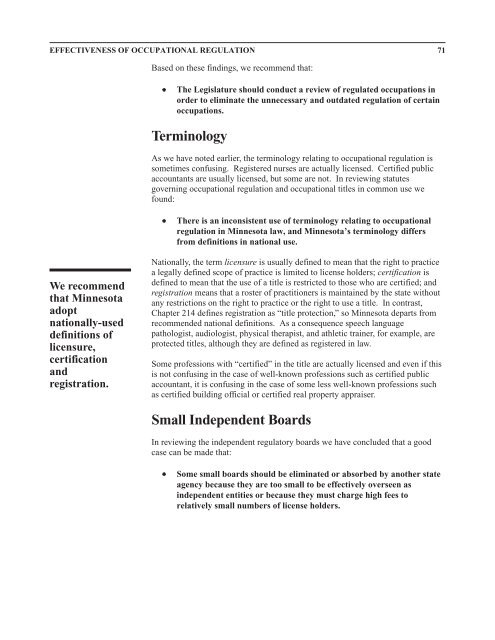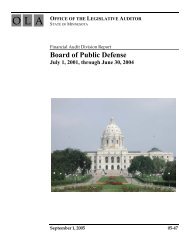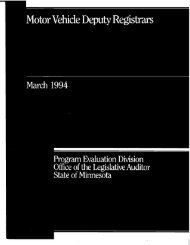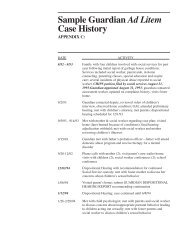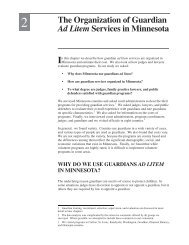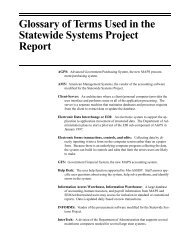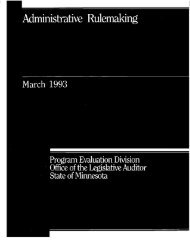Occupational Regulation - Office of the Legislative Auditor
Occupational Regulation - Office of the Legislative Auditor
Occupational Regulation - Office of the Legislative Auditor
Create successful ePaper yourself
Turn your PDF publications into a flip-book with our unique Google optimized e-Paper software.
EFFECTIVENESS OF OCCUPATIONAL REGULATION 71<br />
Based on <strong>the</strong>se findings, we recommend that:<br />
· The Legislature should conduct a review <strong>of</strong> regulated occupations in<br />
order to eliminate <strong>the</strong> unnecessary and outdated regulation <strong>of</strong> certain<br />
occupations.<br />
Terminology<br />
As we have noted earlier, <strong>the</strong> terminology relating to occupational regulation is<br />
sometimes confusing. Registered nurses are actually licensed. Certified public<br />
accountants are usually licensed, but some are not. In reviewing statutes<br />
governing occupational regulation and occupational titles in common use we<br />
found:<br />
· There is an inconsistent use <strong>of</strong> terminology relating to occupational<br />
regulation in Minnesota law, and Minnesota’s terminology differs<br />
from definitions in national use.<br />
We recommend<br />
that Minnesota<br />
adopt<br />
nationally-used<br />
definitions <strong>of</strong><br />
licensure,<br />
certification<br />
and<br />
registration.<br />
Nationally, <strong>the</strong> term licensure is usually defined to mean that <strong>the</strong> right to practice<br />
a legally defined scope <strong>of</strong> practice is limited to license holders; certification is<br />
defined to mean that <strong>the</strong> use <strong>of</strong> a title is restricted to those who are certified; and<br />
registration means that a roster <strong>of</strong> practitioners is maintained by <strong>the</strong> state without<br />
any restrictions on <strong>the</strong> right to practice or <strong>the</strong> right to use a title. In contrast,<br />
Chapter 214 defines registration as “title protection,” so Minnesota departs from<br />
recommended national definitions. As a consequence speech language<br />
pathologist, audiologist, physical <strong>the</strong>rapist, and athletic trainer, for example, are<br />
protected titles, although <strong>the</strong>y are defined as registered in law.<br />
Some pr<strong>of</strong>essions with “certified” in <strong>the</strong> title are actually licensed and even if this<br />
is not confusing in <strong>the</strong> case <strong>of</strong> well-known pr<strong>of</strong>essions such as certified public<br />
accountant, it is confusing in <strong>the</strong> case <strong>of</strong> some less well-known pr<strong>of</strong>essions such<br />
as certified building <strong>of</strong>ficial or certified real property appraiser.<br />
Small Independent Boards<br />
In reviewing <strong>the</strong> independent regulatory boards we have concluded that a good<br />
case can be made that:<br />
· Some small boards should be eliminated or absorbed by ano<strong>the</strong>r state<br />
agency because <strong>the</strong>y are too small to be effectively overseen as<br />
independent entities or because <strong>the</strong>y must charge high fees to<br />
relatively small numbers <strong>of</strong> license holders.


